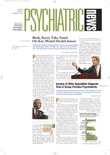One of the best aspects of being president of APA is having the opportunity to hear from APA members about issues affecting our patients and our profession. Many of you have e-mailed me, offering advice, support, expertise, and even some friendly criticism about what we are doing at APA. We are not a shy group! What is clear from these communications is that our members feel very much connected and part of the important work we are doing and that they care a lot about what we are trying to do.
When an APA member writes to me, whether he or she is raising a clinical issue, asking about the work of an APA component, or recommending that some action be taken with regard to a particular problem, the fact that the person is a psychiatrist and a fellow APA member provides an immediate bond and connection. I make new friends among our members regularly, and I very much appreciate the time and trouble many of you are taking to let me know how you think I am doing and how APA is doing.
Which brings me to the issue of APA membership. At this time in our profession, I cannot think of anything more important than our coming together and maintaining a strong APA. APA membership helps solidify our professional identity as psychiatrists; it is an honor to belong to such a great organization. The Association has certainly stood the test of time—it is the oldest medical specialty society in the United States (it was founded in 1844). Moreover, no other psychiatric organization has the depth and breadth of expertise and ability to advocate for our patients and our profession. Under the leadership of our terrific medical director, Jay Scully, M.D., we have one of the most professional and most respected medical organization staffs in the world.
I have had the opportunity to meet with many resident groups in the last year, and inevitably the subject of APA membership comes up. Many residents (as do general members) affiliate with various subspecialty organizations—and that is a good thing because such organizations offer a range of valuable professional and collegial opportunities. As a result, however, many residents are confused about which organizations are most important or valuable to join. My advice to them is simple: It is critical to join APA as well as their subspecialty or professional-interest psychiatric organization.
That our field has many outstanding, effective organizations is indicative of its health and the many exciting developments that have taken place over the past 20 years in research, patient care, and academia. And while becoming active members in them strengthens our ability to accomplish important goals, we cannot permit ourselves to become fragmented or have our voices diminished. We must make sure we retain a unified voice that can speak for all of psychiatry; having that unified voice makes us more effective in communicating consistent and focused messages to legislators, advocacy groups, patients, the public, and other medical groups. Moreover, being an APA member ensures that APA continues to represent a critical mass of psychiatrists whose numbers have meaning in Congress.
Psychiatry needs to work hard to make ourselves heard. Stigma continues to plague our profession and our patients. State and federal budget cuts, no or limited access to care, denied care under managed care plans, and lack of parity coverage are among the problems we and our patients confront daily.
To be sure, I appreciate that APA dues, medical society dues, and specialty organization dues can add up. But the value you are getting for your dollar in belonging to a world-renowned psychiatric organization and joining with your colleagues is unmistakable.
We need you in other ways as well. If you want get involved in psychiatry but prefer to do so closer to home, there are many opportunities at the APA district branch and state association levels. If you are at or near retirement, we need your expertise and help more than ever.
This is a big organization. We are working on many issues. Your voice is important, needed, and valued. Thank you for your continued membership in APA.▪

